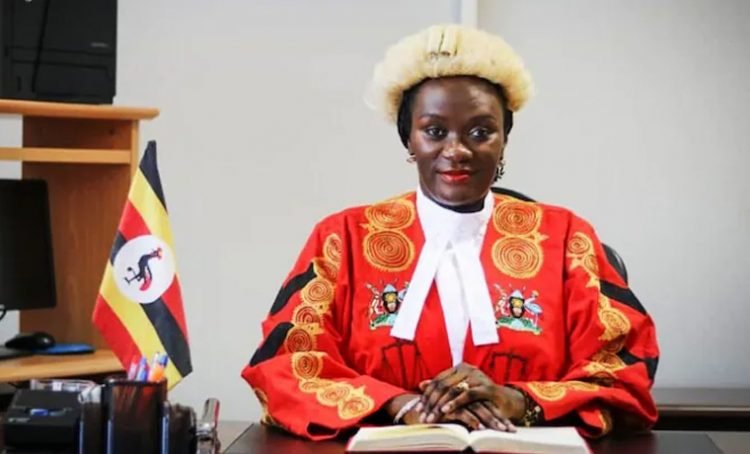Lydia Mugambe
By: Isaac Christopher Lubogo
Abstract
This article offers a critical legal evaluation of R v Lydia Mugambe (2025), a landmark case in which a Ugandan High Court judge and UN tribunal member was convicted in the United Kingdom on charges relating to immigration fraud, forced labour, and witness intimidation. While the Crown Court at Oxford delivered a sentence grounded in established modern slavery jurisprudence, this analysis interrogates the decision’s underlying assumptions, procedural handling, and broader implications for international legal dignity. The discussion begins with a summary of the facts and the ratio decidendi, then proceeds to a comprehensive critique of legal and procedural loopholes—particularly concerning diplomatic immunity, evidentiary treatment, and cultural misinterpretations of domestic labour. Drawing on sound judicial precedent from both the UK and Uganda, the article explores the tension between technical legality and normative justice, highlighting the paradox of judicial activism being criminalized under different moral frameworks. It further outlines remedies available under UK law, international human rights mechanisms, and diplomatic channels open to the Ugandan state. Ultimately, the article reflects on the case not merely as a prosecution of an individual but as a litmus test for how far global legal systems are willing to accommodate transformative jurists within their borders.
I. Brief Facts and Procedural History
In R v Mugambe (Crown Court at Oxford, May 2025), Hon. Justice Lydia Mugambe, a Ugandan High Court judge and UN tribunal member, was convicted on four counts:
1. Conspiracy to facilitate a breach of UK immigration law;
2. Arranging/facilitating travel for exploitation;
3. Forced or compulsory labour;
4. Witness intimidation.
She was sentenced to six years and four months’ imprisonment, accompanied by a restraining order and compensation directive.
II. Ratio Decidendi of the Judgment
The court’s reasoning centered on the abuse of diplomatic channels, deliberate use of false documents, exploitation of a vulnerable individual, and obstruction of justice. It relied heavily on the UK’s Modern Slavery Sentencing Guidelines and precedents including:
AG’s Reference Nos 2–5 of 2013,
R v Rooney (2019),
R v Kuznetsov (2024),
R v Khellaf (2016).
The sentence emphasized deterrence and the seriousness of witness intimidation.
III. Critical Evaluation of Legal Loopholes
A. Procedural Loopholes
1. Diplomatic Immunity: The judgment fails to explain how immunity under Article 105 of the UN Charter and the Vienna Convention on Diplomatic Relations was waived, especially given Mugambe’s status as a sitting UN judge.
2. Consent vs. Coercion: The victim’s prior voluntary service raises questions about how coercion was interpreted, with little scrutiny of the blurred lines between domestic dependency and forced labour.
3. Labour vs. Slavery: The conflation of informal domestic labour with slavery standards invites scrutiny. The ruling appears to apply Western legal norms without sufficient contextualization of African familial or cultural dynamics.
B. Substantive Legal Loopholes
1. Overreach of the Modern Slavery Act: The expansive statutory language risks penalizing non-commercial dependency arrangements. The requisite mens rea for slavery—intent to dehumanize or dominate—was insufficiently established.
2. Overlapping Counts: Sentencing for Counts 1–3 demonstrates insufficient disaggregation of facts, potentially breaching sentencing proportionality principles (see R v Millberry).
3. Mitigation Minimization: Mugambe’s status as a single mother, mental health challenges, and high judicial responsibilities were acknowledged but discounted due to the perceived absence of remorse—a moral rather than legal criterion.
IV. Precedent and the Fallibility of Judicial Activism
Justice Mugambe is known for progressive decisions such as:
CEHURD v Mulago Hospital (2020), affirming the right to health;
Kakumba & Another, upholding prisoners’ voting rights (affirmed in Petition 16 of 2011).
Her commitment to constitutional interpretation grounded in human dignity distinguished her jurisprudence. Her prosecution raises questions about whether judicial values can be turned into liabilities.
V. Remedies Under UK and International Law
1. Appeal (Criminal Appeal Act 1968): She can contest the application of law, sentence proportionality, and evidentiary treatment.
2. Judicial Review: Procedural defects—especially regarding immunity and due process—may form the basis for review.
3. European Court of Human Rights:
Article 6 (fair trial),
Article 8 (private/family life),
Article 3 (inhuman treatment due to prison/mental health conditions).
4. UN Judicial Immunity: The UN International Residual Mechanism may assess breaches of immunity and retaliatory prosecution risks.
VI. Options for Uganda
A. Diplomatic Protection: Uganda may invoke rights under the Vienna Convention to:
Request full trial records,
Seek clarification on immunity status,
Petition for repatriation or sentence transfer.
B. Judicial Oversight Mechanisms:
The Judicial Service Commission may launch an independent inquiry,
Consider administrative suspension pending appeal,
Liaise with international legal forums.
VII. Ethical and Philosophical Reflections
Moral error vs. criminal intent: The ruling seems to conflate legal culpability with subjective morality.
Humanitarian motive vs. legal infraction: Did she act out of exploitative intent or structural necessity?
Cultural bias: The application of modern slavery standards may ignore African norms of informal caregiving and mutual obligation.
VIII. Conclusion: A Trial Beyond the Defendant
Justice Lydia Mugambe’s prosecution prompts a deeper inquiry into how international legal systems treat reformist actors. Her fall from grace is not merely a personal tragedy, but a commentary on whether legal systems protect—or punish—those who dare to reimagine justice.
This is more than a case; it is a challenge to the integrity of transnational legalism itself.
About the Author:
Isaac Christopher Lubogo is a Ugandan lawyer and lecturer








